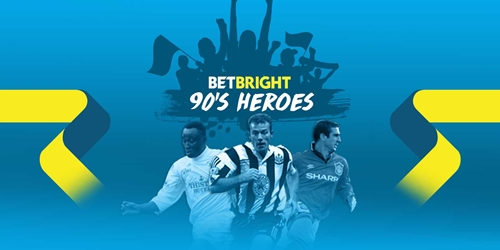’90s Heroes is a new series by Adam Hurrey on the Bet Bright football blog which looks back on the legends of the game in what now seems a simpler time for football.
Osvaldo Giroldo Júnior. There we are, that’s the legally enforceable opening-paragraph mention of his full Brazilian name over and done with. Until that chap who played for Lyon stumbled across some sort of real-life cheat code for free-kicks in the 2000s, the only Juninho worth knowing about was a 5ft 5in bundle of energy who swapped the mega-city sprawl of São Paulo for the village of Ingleby Barwick in the autumn of 1995.
The mid-90s had already been one long, sun-drenched transfer coup. But while the costly import of Dennis Bergkamp and the ageing (if still inspirational) pair of Jurgen Klinsmann and Ruud Gullit were all lured by London life, 22-year-old Juninho had chosen a rather more curious destination to take his burgeoning career to a new level.
Allowing even for Coventry’s distinctly underwhelming signing of Isaias that summer (who sadly failed to dovetail with the subtle talents of Noel Whelan) Juninho was the first elite Brazilian to join the Premier League party. Before such luminaries as Kleberson, Paulinho and Andre Santos and others would ruin the mystique over the next couple of decades, there was a rather quaint, two-dimensional fascination with a Brazilian footballer. That one of their finest young talents would want to uproot to the north East of England (“it’s Middlesbrough, not the North Pole”, mumbled his manager Bryan Robson) was even more of a peculiarity.
The premier leagues finest Brazilian import still to this day – Juninho #middlesbrough pic.twitter.com/AjMRLA45lQ
— FlashBack Football (@FlashBKFootball) February 19, 2016
Where Robson’s interest had been piqued – along with many other wide-eyed, awe-struck Englishmen – was the criminally forgotten Umbro Cup that summer, the infrastructural warm-up for Euro ‘96 the following year. The final match of the mini tournament saw the new world champions take on the hosts with a forward line of the exceptionally arrogant Edmundo and an 18-year-old fully-fledged phenomenon in Ronaldo. They were backed up by a tiny playmaker whose shoulders were barely broad enough to accommodate his shirt number, let alone the prestige of being Brazil’s latest No.10.
After Graeme Le Saux had threatened to upstage everyone with a volley into the top corner to put England ahead, the visitors finally strolled into gear.
Despite his impish free-kick for the equaliser and through-ball for Ronaldo to take the lead, this was very much an introduction of Juninho’s ability to an English audience – or “Jujinho” as Sky insisted on calling him – rather than confirmation of what they might nowadays have already gleaned from YouTube.
That showcase, though, was enough to persuade a newly-promoted Premier League side that their shiny new stadium needed someone to help fill it. Middlesbrough had just made Nick Barmby their club-record signing for £5.25m, but their ambitious trio of Robson, chief executive Keith Lamb and owner Steve Gibson were (with no disrespect to Kingston-upon-Hull’s young footballers) in the market for something rather more exotic.
Half a million less than that was required to prise Juninho away from Sao Paulo, which only added to the immediate sense that Robson and Lamb’s air miles had earned them the deal of the summer. Juninho later revealed:
“Bryan Robson and Keith Lamb came to Brazil, not to convince me to come to Middlesbrough but to show me what they wanted the club to become. Once I saw that, I trusted in them.”
Lamb’s justifiably proud announcement – “it is a measure of Middlesbrough’s ambition that we have signed the most sought-after player in the world and we have beaten all the top Premiership clubs and several big European clubs to his signature” – stoked the anticipatory fires even further among the fans when Juninho was finally flown over for his unveiling in October.
“Good morning, welcome to Teesside Airport, bom dia, put this on to keep you warm” was the greeting, as the sheepish-looking Juninho was handed a giant white baseball cap on the tarmac. Local news continued the puzzling mispronunciation of his abbreviated name as “Jujino” arrived at the Riverside to a carnival atmosphere of yellow balloons, industrial barrels hastily reinvented as samba drums and (as the geography started to fall apart) sombreros.
The superbly amateurish pleasantries out the way, Juninho was finally cleared the following month to make his debut against Leeds, against whom he would later experience his lowest point in English football. For now, though, the Boro fans got a proper view of just how small this man-boy was: 5ft 5 in his studs and probably only tipping 10st thanks to his oversized shirt.
After just 11 minutes, those tiny legs sped past the outstretched leg of Gary McAllister and slid through a delightfully-weighted pass for Jan Aage Fjortoft to round off what sounds like the most mid-90s goal imaginable by dinking the ball over John Lukic and his ghastly orange goalkeeper’s kit.
The Independent’s report that day describes him as “swift and selfless, instinctive and incisive, he so bemused Leeds with his surges that two players were booked for tripping him.” A nutmeg on Carlton Palmer seemed almost obligatory, seeing as he could probably have comfortably run between his legs too. Meanwhile, clearly keen to debunk any early doubts over his suitability for the rough and tumble of the English game, Juninho then got himself booked for an industrial challenge on the 5ft 5in-wide Tony Yeboah. This kid wasn’t scared.
Juninho’s instant connnection with the Middlesbrough fans owed as much to his tireless work ethic as it did his natural attacking flair, and the failings of his fellow Brazilians at Middlesbrough only enhanced his reputation. While the consistently big-boned Branco gave half-time pep talks of “Pass pass pass, goal! Lager, lager, lager, nightclub!”and Emerson later complained about the weather, Juninho was picking fights with highly amused Belgian man-mountain Philippe Albert and politely RSVP-ing “no thanks” to Vinnie Jones’ offer of a traditional welcome to the Premier League:
Newcastle United v Middlesbrough
Juninho picks on Philippe Albert pic.twitter.com/h1S8lOYbhj— The League Magazine (@Theleaguemag) August 3, 2016
Vinnie Jones vs Juninho. pic.twitter.com/lpleQnMOEx
— 90s Football (@90sfootball) August 11, 2016
Juninho’s adaptation to the Premier League encouraged Middlesbrough to spend big again the following summer. Sadly, for every Fabrizio Ravanelli, there was a Mikkel Beck. For every Gianluca Festa, there was a Vladimir Kinder. For every Phil Stamp, there was a Phil Stamp. There were two Cup finals, and two heartbreaking defeats. There were 51 Premier League goals – bettered by only six teams that season – but still relegation.
Leeds v Middlesbrough. Lucas Radebe and Juninho pic.twitter.com/RrIFdW5OKs
— The League Magazine (@Theleaguemag) February 21, 2014
The final game of the 1996/97 season saw a spent Juninho on his haunches at Elland Road, having tried in vain to keep Boro afloat, and that seemed to be the end of his association with the club. A £13m move to Atletico Madrid was undermined by a broken leg – ending his chances of going to the 1998 World Cup – and he was back on loan at the Riverside to try and rediscover that magic. A permanent return – this time as a World Cup winner in 2002 – seemed to risk stretching the love affair too far, only for the 31-year-old (looking almost as sprightly as he had done eight years earlier) to summon some sharpness in those battered legs and finally secure some silverware for the club to whom he had kept gravitating back. That 2004 League Cup win, he claims, meant as much as his bit-part role in a Brazil shirt two years previously.
Fast forward to 2016 and, despite all the carefully-managed Paul Pogba hype and the cartoonish numbers that go with modern transfer deals, it’s hard to imagine any set of supporters being as excited by a signing as those 5,000 Middlesbrough fans who took a sick day off work to don an inaccurate sombrero and watch “Jujino” engage in some brief ball-juggling with Bryan Robson one sunny day in 1995. They definitely know his name up there now.
For the next instalment of ’90s Heroes, check out the Bet Bright football blog on Friday.







